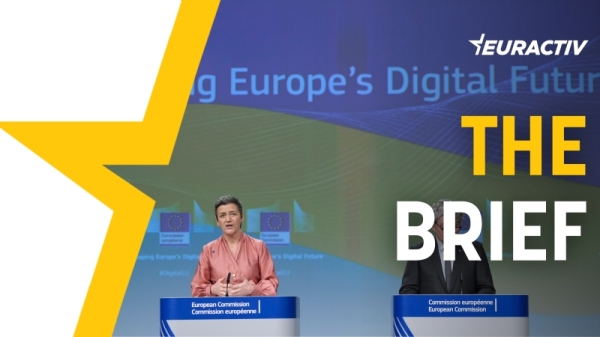The Brief – DSA is branching into genAI regulation for EU elections

While the European Commission released its guidelines on how to avoid the abuse of generative artificial intelligence (AI) in June’s EU elections, the internet was ablaze with theories that a video intended to show the wellbeing of Kate Middleton, a member of the British Royal Family, was fake and created by AI.
After Kensington Palace was found to have released a wildly photoshopped picture of Middleton, faith in the centuries-old institution was shaken.
A subsequent video of Middleton released on 22 March had little hope of quelling rumours, once the credibility of the institution itself was questioned.
These capabilities are of keen interest in the upcoming EU elections, both on the national and EU level, as fake videos and images of public persons can now easily be generated, thanks to AI.
The technology behind such “deepfakes” is generative AI (genAI). It is based on foundation models, which learn from a vast array of data to create text, images and video. Examples of such models include OpenAI’s ChatGPT and Google’s Gemini.
The Commission released guidelines on March 26, which apply to the largest platforms in the EU, such as Facebook, Instagram, Twitter or Google Search. They are classified as very large online platforms (VLOPs) and Very Large Online Search Engines (VLOSEs) under the Digital Services Act (DSA), the bloc’s landmark content moderation law.
Simultaneously, the Commission has asked big tech platforms for information on their risk mitigation measures related to genAI and electoral processes, to gauge compliance with the DSA.
For their part, platforms like Microsoft, Google, and Meta have pledged to prevent AI election interference.
The Commission DSA guidelines on genAI require VLOPs and VOSEs to use watermarks, integrate safeguards such as content moderation, and ensure the sources used when a model provides information related to electoral processes is official, among other things.
But many of the dangers of genAI stem from the source; the models where the fake content that can jeopardise elections is created. Platforms can only do so much to moderate content – especially content that to their human and machine moderators might look real, when it is, in fact, fake.
Some platforms are already working on such labelling. Their capabilities are limited when it comes to genAI content created on other platforms.
Meta, for example, which offers an image generation service but also operates Facebook, said in February that it already includes visible and invisible watermarks for images created with its genAI platform.
But it is “not yet possible to identify all AI-generated content”, particularly audio and video created by other genAI platforms “and there are ways that people can strip out invisible markers”, the company said.
The Commission’s guidelines hint at this reality, and draw on the artificial intelligence Act (AI Act), a landmark law passed this month to regulate the technology, to close the gap.
The AI Act requires that genAI content is labelled as such at the source in a way that social media platforms can read, so that they can then inform their readers.
However, none of these requirements from the AI Act will enter into force by the time the EU elections take place. While the AI Office is gearing up for enforcing the AI Act, the Commission has little choice but to use existing tools, the DSA, to protect elections.
The elections will be a test for how regulation centred around platforms, like the DSA, can be implemented on genAI, while the Commission iterates on technology-specific guidance.
The Roundup
The European Commission will sign a strategic partnership with Australia on critical raw materials, a source familiar with the matter told Euractiv, as the EU continues its drive to secure access to these materials from sources other than China.
European Union agriculture ministers backed on Tuesday the European Commission’s initiatives on animal welfare, calling for tougher standards on transport, labelling, and slaughter in the next political mandate.
The West should aim to create more “strategic difficulties” in a bid to reign in Russia’s behaviour, with the first priority being to “stop the aggression against Ukraine”, an area where NATO is not doing enough, Sweden’s Foreign Minister Tobias Billström told Euractiv.
Moldova’s decision to join the EU’s sanctions regime against Russia last November has fueled Moscow’s already vast campaign of disinformation and hybrid warfare against the EU candidate country.
Western sanctions and their effectiveness are one of the favourite topics of Russian propaganda, demonstrating both the importance for the Kremlin of managing this narrative and the real impact sanctions are having on the Russian economy.
Last but not least, for more policy news, check out this week’s Health Brief and the Green Brief.
Look out for…
- Commissioner Thierry Breton delivers keynote speech at ‘Tech for Future’ event on Thursday.
- Commissioner Iliana Ivanova in China Friday-Sunday; Japan Monday-Wednesday.



